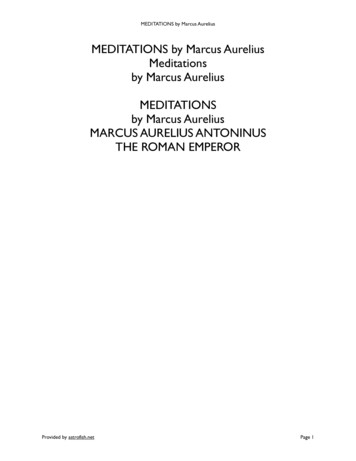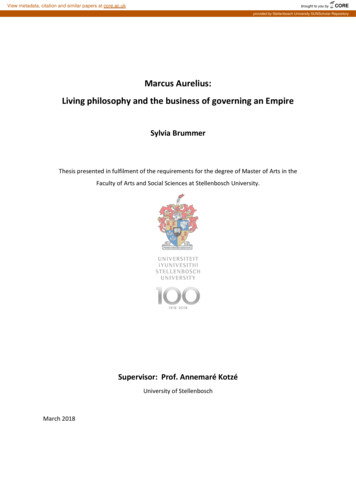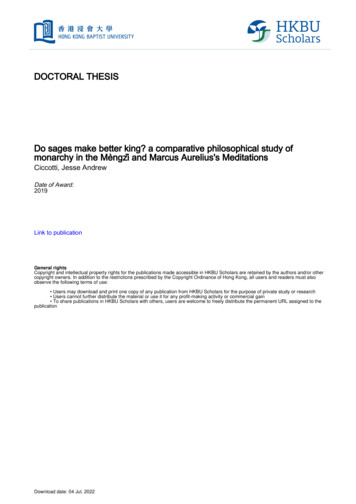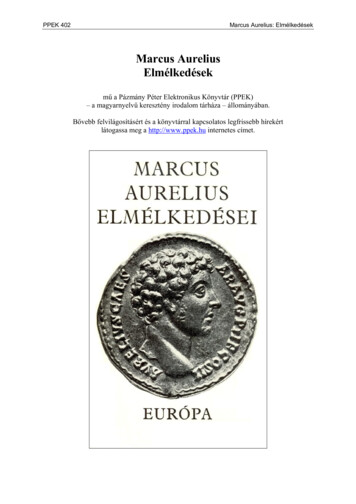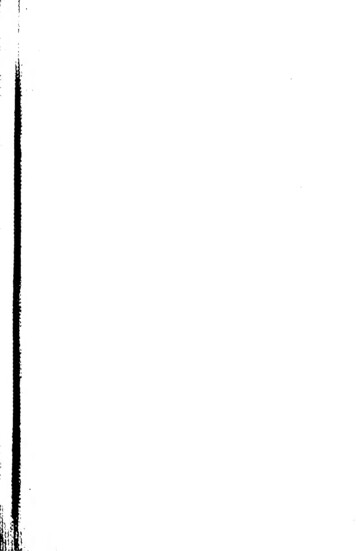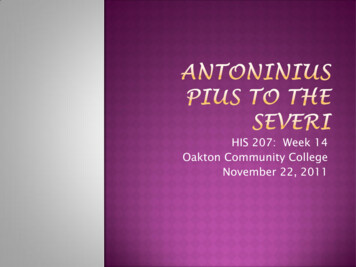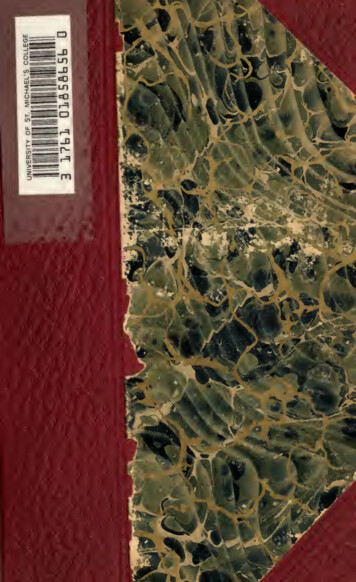
Transcription
\)tnrrttaIGibrary
OFMARCUS AURELIUS ANTONINUS,TRANSLATED BY GEORGE LONG.17 te 27 KING ST. EAlTiTORONTO.NEW YORKLUPTON PUBLISHING COMPANY,:THEF.M.Nos. 73-76WALKERSTREET.
CONTENTS.M. AURELJUS ANTONINUS.PAGE5THE PHILOSOPHY OF ANTONINUS19THOUGHTS OF MARCUS AURELIUS ANTONINUS41
BIOGRAPHICAL SKETCHOFM.AURELIU3 ANTONINUS.M. ANTONINUS was born at Rome A. D. 121, on the 26ft, ofHis father Annius Verus died while he was praetor.His mother was Domitia Calvilla, also named Lucilla. TheEmperor Antoninus Pius married Annia Galeria Faustina,the sister of Annius Verus, and was consequently Antoninus uncle. When Hadrian adopted Antoninus Pius anddeclared him his successor in the empire, Antoninus PiusApril.adopted both L. Ceionius Commodus, the son of AeliusCaesar, and M. Antoninus, whose original name was M.Annius Verus. Antoninus took the name of M. AeliusAurelius Verus, to which was added the title of Caesar inA. D. 139 the name Aelius belonged to Hadrian s family,and Aurelius was the name of Antoninus Pius. When M.Antoninus became Augustus, he dropped the name of Verusand took the name of Antoninus. Accordingly he is generally named M. Aurelius Antoninus, or simply M. Anton:inus.The youth was mostcarefully brought up.Hethanksthe gods (r. 17) that he had good grandfathers, good parents, a good sister, good teachers, good associates, goodkinsmen and friends, nearly everything good. He had thehappy fortune to witness the example of Ms uncle andadoptive father Antoninus Pius, and he has recorded in hiswork (i. 10 vr. 30) the virtues of this excellent man andprudent ruler. Like many young Romans he tried his handat poetry and studied rhetoric.Herodes Atticus and M.Cornelius Fronto were his teachers in eloquence. Thereare extant letters between Fronto and Marcus, which showthe great affection of the pupil for the master, and the master s great hopes of his industrious pupil.M. Antoninusmentions Fronto (i. 11) among those to whom he was indebted for his education.When he was eleven years old, he assumed the dress ofphilosophers, something plain and coarse, became a hardstudent, and lived a most laborious abstemious life, even sofar as to injure his health.Finally, he abandoned poetryand rhetoric for philosophy, and he attached himself to thesect of the Stoics.But he did not neglect the study of law,which was a useful preparation for the high place which hewas designed to fill. His teacher was L. Vohisianus Maecianus, a distinguished jurist. We must suppose that helearned the Roman discipline of arms, which was a necessary part of the education of a man who afterwards led hitJLroops to battle against a warlike race.;
BIOGKAPIIICAL SKETCH.6Antoninus has recorded in his first book tbe names of m8teachers and the obligations which he owed to each ofthem. The way in which he speaks of what he learnedfrom them might seem to savor of vanity or self-praise, ifwe look carelessly at the way in which he has expressedhimself ; but if any one draws this conclusion, he will beAntoninus means to commemorate the meritsmistaken.of his several teachers, what they taught and what a pupilmight learn from them. Besides, this book like the elevenother books, was for his own use, and if we may trust thenote at the end of the first book, it was written during oneof M. Antoninus campaigns against the Quadi, at a timewhen the commemoration of the virtues of his illustriousteachers might remind him of their lessons and the practical uses which he might derive from them.Among his teachers of philosophy was Sextus of ChaeWhat lie learned from thisroneia, a grandson of Plutarch.excellent man is told by himself (i. 9). His favorite teacherwas Q. Junius Rusticus (i. 7), a philosopher and also a manof practical good sense in public affairs. Rusticus was theadviser of Antoninus after he became emperor.Youngmen who are destined for high places are not often fortunate in those who are about them, their companions andteachersand I do not know any example of a youngprince having had an education which can be comparedwith that of M. Antoninus. Such a body of teachers distinguished by their acquirements and their character willhardly be collected again and as to the pupil, we have not;;had one like him since.Hadrian died in July A. D. 138. and was succeeded byAntoninus Pius.M. Antoninus married Faustina, hiscousin, the daughter of Pius, probably about A. D.he had a daughter born infrom his adoptive father the147.title14(3,forM. Antoninus receivedof Caesar and was associated with him in the administration of the state. Thefather and the adopted son lived together in perfect friendAntoninus was a dutiful son. and theship and confidence.emperor Pius loved and esteemed him.Antoninus Pius died in March 161. The Senate, it issaid, urged M. Antoninus to take the solemn administration of the empire, but he associated with himself the otheradopted son of Pius, L. Ceionius Commodus, who is generThus Rome for the first time hadally called L. Verus.two emperors. Verus was an indolent man of pleasure andAntoninus however bore withunworthy of his station.him, and it is said that Verus had sense enough to pay tovirtuoushis colleague the respect due to his character.emperor and a loose partner lived together in peace, andtheir alliance was strengthened by Antoninus giving toVerus for wife his daughter Lucilla. The reign of Antoninus was first troubled by a Parthianwar, in which Verus was sent to command, but he didnothing, and the success that was obtained by the Romansin Armenia and on the Euphrates and Tigris was due to hisAThis Parthian war ended in 165.of Italy was also threatened by the rude peoplebeyond the Alps from the borders of Gallia to the easterngenerals.The north
J/.1UUELIUS ANTONINUS.1These barbarians attempted to breakside of the Iladriatic.into Italy, as the Germanic nations had attempted nearthree hundred years before; and the rest of the life oftoninus with some intervals was employed in driving backAnthe invaders. In 169 Verus suddenly died, and Antoninusadministered the state alone.In A.175 Avidius Cassius, a brave and skilful Romancommander who was at the head of the troops in Asia, reanddeclared himself Augustus. But Cassius wasvoltedassassinated by some of his officers, and so the rebellioncame to an end. Antoninus showed his humanity by histreatment of the family and the partisans of Cassius, and hisletter to the senate in which he recommends mercy is extant.(Vulcatius, Avidius Cassius, c. 12.)Antoninus set out for the east on hearing of Cassius s reWe know that in A. 174 he was engaged in a warvolt.against the Quadi, Marcomanni and other Germanic tribes,and it is probable that he went direct from the German warwithout returning to Rome. His wife Faustina who accompanied him into Asia died suddenly at the foot of the Taurus to the great grief of her husband. Capitolinus who haswritten the life of Antoninus, and also Dion Cassius accusethe empress of scandalous infidelity to her husband and ofabominable lewdness. But Capitolinus says that Antoninuseither knew it not or pretended not to know it. Nothing isso common as such malicious reports in all ages, and theAntoninus lovedhistory of imperial Rome is full of them.his wife and he says that she was "obedient, affectionate,and simple." The same scandal had been spread aboutFaustina smother, the wife of Antoninus Pius, and yet hetoo was perfectly satisfied with hia wife. Antoninus Piussays in a letter to Fronto that he would rather live in exilewith his wife than in his palace at Rome without her.There are not many men who would give their wives a bettercharacter than these two emperors. Capitolinus wrote inthe time of Diocletian. He may have intended to tell theDion Cassius,truth, but he is a poor, feeble biographer.the most malignant of historians, always reports and perhaps he believed any scandal against anybody.Antoninus continued his journey to Syria and Egypt, andon his return to Italy through Athens he was initiated intothe Eleusinian mysteries. It was the practice of the emperorto conform to the established rites of the age and to performWe cannot conreligious ceremonies with due solemnity.clude from this that he was a superstitious man, though wemight perhaps do so, if his book did not show that he wasnot.But this is only one among many instances that aruler s public acts do not always prove his real opinions.prudent governor will not roughly oppose even the superstitions of his people, and though he may wish that they werewiser, he will know that he cannot make them so by offending their prejudices.Antoninus and his son Commodus entered Rome in triumph on the 2:M of December, A.D. 176. In the followingyear Commodus was associated with his father in the empireand took the name of Augustus. This year A.D. 177 ifmemorable in ecclesiastical U siory. Attalus and otherr>.r>.A\
BIOGRAPHICAL SKETCH.8were put to death at Lyon for their adherence to the Christian religion. The evidence of this persecution is a letterpreserved by Eusebius (E. H. v. 1 ; printed in Routh s ReThe letter is from theliquiae Sacrse, vol. i. with notes).Christians of Vienna and Lugdunum in Gallia (Vienna nndLyon) to their Christian brethren in Asia and Phrygia; andIt contains a veryit is preserved perhaps nearly entire.particular description of the tortures inflicted on the Chvistians iu Gallia, a/id it states that while the persecution wasgoing on, Attalus a Christian and a Roman citizen wasloudly demanded by the populace and brought into the amphitheatre, but the governor ordered him to be reserved withthe rest who were in prison until be had received instrucIt is not clear who the "rest"tions from the emperor.were who are mentioned in the letter. Many had beentortured before the governor thought of applying to theemperor. Tha imperial rescript, says the letter, was thatthe Christians should be punished, but if they would denyOn this the work begantheir faith, they must be released.again. The Christians who were Roman citizens were beheaded: the rest were exposed to the wild beasts in theamphitheatre. Some modern writers on ecclesiastical history, when they use this letter, say nothing of the wonderfulstories of the martyrs sufferings.Sanctus, as the lettersays, was burnt with plates of hot iron till his body was oneore and had lost all human form, but on being put to therack he recovered his former appearance under the torture,which was thus a cure instead of a punishment. He wasafterwards torn by beasts, and placed on an iron chair androasted.He died at last.The letter is one piece of evidence. The writer, whoeverhe was that wrote in the name of the Gallic Christians, isour evidence both for the ordinary and the extraordinarycircumstances of the story, and we cannot accept his evidence for one part and reject the other.often receiveunall evidence as proof of a thing which we believe to bewithin the limits of probability or possibility, and we rejectixactly the same evidence, when the thing to which it refersippears very improbable or Impossible. Exit this is a falsetaethod of inquiry, though it is followed by some modernWriters, who select what they like from a story and rejectthe rest of the evidence; or if they do not reject it, they disman can only act consistently byhonestly suppress it.accepting all this letter or rejecting it all, and we cannothimButhe who rejects it may still adblamefor either.toit that such a letter may be founded on real facts; and hewould make this admission as the most probable way ofaccounting for the existence of the letter: but if, as hewould suppose, the writer has stated some things falsely, heWeAtell what part of his story is worthy ofThe war on the northern frontier appearscannotcredit.tohave beenuninterrupted during the visit of Antoninus to the East, andon his return the emperor again left Rome to oppose thebarbarians. The Germanic people were defeated in a greatbattle A.D. 179.During this campaign the emperor wasseized with some contagious malady, of which he died inthe camp at Sirmium (Mitrovitz) on the Save in Lower Pan-
31.AURELIUS ANTONINUS.9nonia, but at Vindebona (Vienna) according to other authorities, on the 17th of March A.D. 180, in the fifty -ninthyear of his age. His son Comruodus was with him. Hisbody, or the ashes probably, was carried to Rome, and heThose who could affordreceived the honor of deification.i* had his statue or bust, and when Capitolinus wrote, manypeople still had statues of Antoninus among the Dei Penates or household deities. He was in a manner made aHis son Coinmodus erected to his memory the Ansaint.tonine column which is now in the Piazza Collona at Rome.The bassi rilievi which are placed in a spiral line round theshaft commemorate his father s victories over the Marcomanni and the Quadi, and the miraculous shower of rainwhich refreshed the Roman soldiers and discomfited theireiiemies-.The statue cf Antoninus was placed on the column, but it was removed at some time unknown, and abronze statue of St. Paul was put in its place by Pope Sixtus the fifth.The historical evidence for the times of Antoninus is verydefective, and some of that which remains is not credible.The most curious is the story about the miracle which happened in A.D. 174, during the war with the Quadi. TheRoman army was in danger of perishing by thirst, but asudden storm drenched them with rain, while it dischargedfire and hail on their enemies, and the Romans gained aAll the authorities which speak of the battlegreat victory.speak also of the miracle. The Gentile writer* assign it totheir gods, and the Christians to the intercession of theChristian legion in the emperor s army. To confirm theChristian statement it is added that the emperor gave thetitle of Thundering to this legionbut Dacier and otherswho maintain the Christian report of the miracle, admitthat this title of Thundering or Lightning was not given tothis legion because the Quadi were struck with lightning,but because there was a figure of lightning on their shields,and that this title of the legion existed in the time of Au;gustus.Scaliger alsohad observed that the legion was calledThundering before the reign of Antoninus. We learn thisfrom Dion Cassius (Lib. 55, c. 23, and the note of Reimarus) who enumerates all the legions of Augustus time. Thename Thundering or Lightning also occurs on an inscrip*tion of the reign of Trajan, which was found at TriesteEusebius (v. 5) when he relates the miracle, quotes Apolinarius, bishop of Hierapolis, as authority for this nambeing given to the legion Melitene by the emperor in consequence of the success which he obtained through then,from which we may estimate the value of Apolin.prayersarms testimony. Eusebius does not say in what bookDion says that thApolinarius the statement occurs.Tbundering legion was stationed in Cappadocia in the tim*of Augustus.Valesius also observes that in the Notitia o*the Imperium Romanum there is mentioned under the con?mander of Armenia the Praefectura of the twelfth legion;o<named "Thundering Mditene;" and this positionArmenia will agree with what Dion says of its positionCapyadociaiAccordingly Valesius concludes thatinin
BIOGRAPHICAL SKETCH.10was not the name of the legton, but of the town In which Itwas stationed. The legions did not, he says, take theirname from the place where they were on duty, but from thecountry in which they were raised, and therefore, whatEusebius says about the Melitene does not seem probable tohim. Yet Valesius on the authority of Apolinarius andTertullian believed that the miracle was worked through theprayers of the Christian soldiers in the emperor s army.Kufinus does not give the name of Melitene to this legion,says Valesius, and piobably he purposely omitted it, because he knew that Melitene was the name of a town in Armenia Minor, where the legion was stationed in his time.The emperor, it is said, made a report of his victory to theSenate, which we may believe, for such was the practice ;but we do not know what ho said in his letter, for it is notextant. Dacier assumes that the emperor s letter was purpose4y destroyed by the Senate or the enemies of Christianity, that so honorable a testimony to the Christians andThe critic hastheir religion might not be perpetuated.however not seen that he contradicts himself when he tellsis the purport of the letter, for he says that it was destroyed,even Eusebius could not find it. But there does exist aletter in Greek addressed by Antoninus to the Eoman SenIt \a sometimes printedAte after this memorable victory.after Justin s second Apology, though it is totally unconnected with the apologies.This letter is one of the most stupidforgeries of the many which exist, and it cannot be possibly/Bunded even on the genuine report of Antoninus to theIf it were genuine, it would free the emperor fromitenate.the charge of persecuting men because they were Christians,Tor he says in this false letter that if a man accuse anotheronly of being a Christian and the accused confess and therein nothing else against him, he must be set free; with thismonstrous addition made by a man Inconceivably ignorant,that the informer must be burnt alive.*During the time of Antoninus Pius and Marcus Antoninus there appeared the first Apology of Justinus, and underM. Antoninus the Oration of Tatian against the Greeks,which was a fierce attack on the established religions, theaddress of Athenagoras to M. Antoninus on behalf of theChristians, and the Apology of Melito, bishop of Sardes,also addressed to the emperor, and that of Apolinarius.The first Apology of Justinus is addressed to AntoninusPius and his two adopted sons M. Antoninus and L. Verus;but we do not know whether they read it. The secondApology of Justinus is addressed to the Roman Senate, but>nd*Euseblua (v. 5) quotes Tertullian s Apology to the RomanSenate in confirmation of the story. Tertullian, he says, writesthat letters of the emperor were extant, in which he declares thathis army was saved by the prayers of the Christians and thathe threatened to punish with death those who ventured to accuse us.It is possible that the forged letter which is now extantmay be one of those which Tertullisni hnd seen, for he uses theA grent deal has been written aboutletters."plural numberthis miracle of the Thundering Legion, and more than is wortlj;"""ttading.
M.AURELIUS ANTONINUS.1)nothing in it which shows its date. In one passagfis speaking of the persecution of the Christians,Justinus says that even men who followed the Stoic docwhentrines,they ordered their lives according to ethicalreason, were hated and murdered, such as Ileraclitus,Musonius in his own times and others for all those who inany way labored to live according to reason and avoidedwickedness were always hated and this was the effect ofthe work of daemons.Justinus himself is said to have been put to death atJiome, because he refused to sacrifice to the gods; but thecircumstances of his death are doubtful, and the time is unIt cannot have been in the reign of Hadrian, ascertain.one authority states nor in the time of Antoninus Pius, ifthe second Apology was written in the time of M. Antonthereiswhere he;;;inus.The persecution in which Polycarp suffered at Smyrna belongs to the time of M. Antoninus. The evidence for it isthe letter ofthe church of Smyrna to the churches of Philomelium and the other Christian churches, and it is preserved byEusebius (E. II. iv. 15). But the critics do not agree aboutthe time of Polycarp s death, differing in the two extremesto the amount of twelve years.The circumstances of Polycap s martyrdom were accompanied by miracles, one ofwhich Eusebius (iv. 15) has omitted, but it appears in theoldest Latin version of the letter, which Usher published,and it is supposed that this version was made not long afterthe time of Eusebius. The notice at the end of the letterstates that it was transcribed by Cains from the copy ofIrenaeus, the disciple of Polycarp, then transcribed by Soafter which I Pionius again wrote itout from the copy above mentioned, having searched it outetc.by the revelation of Polycarp, who directed me toThe story of Polycarp s martyrdom is embellished withmiraculous circumstances which some modern writers onecclesiastical history take the liberty of omitting.*In order to form a proper notion of the condition of theChristians under M. Antoninus we must go back to Trajan stime. When the younger Pliny was governor of Bithynia,the Christians were numerous in those parts, and the worshippers of the old religion were falling off. The templeswere deserted, the festivals neglected, and there were noThose who were interpurchasers of victims for sacrifice.ested in the maintenance of the old religion thus found thattheir profits were in danger.Christians of both sexes andof all ages were brought before the governor, who did notknow what to do with them. He could come to no otherconclusion than this, that those who confessed to be Chris-crates at Corinth";it,"*Conyers Middleton, An Inquiry into the Miraculous Powers,Middleton says that Eusebius omitted to mention thedove, which flew out of Polycarp u body, and Dodwel! and ArchWakehave done the same. Wake says,I am so little abishopfriend to such miracles th;it I thought it better with Enselrius toomit that ci re it instance than to mention it from Bishop Usher sManuscript." which manuscript however, Bays Middlatou, heafterwards declares to be so well attested that w need not anyetc. p. 126."further assurance of the truth ofit.
BIOGRAPHICAL SKETCH.12tians and persevered in their religion ought to be punished;for nothing else, for their invincible obstinacy.He foundno crimes proved against the Christians, and he could onlycharacterize their religion as a depraved and extravagantifwhich might be stopped, if the people were allowed the opportunity of recanting. Pliny wrote this in aTrajan (Plinius, Ep. x. 97). He asked for the emperor s directions, because he did not know what to do:He remarks that he had never been engaged in judicial inquiries about the Christians, and that accordingly he didnot know what or how far to inquire and punish. Thisproves that it was not a new thing to inquire into a man sprofession of Christianity and to punish him for it. Tra*jan s Rescript is extant. He approved of the governor sjudgment in the matter but he said that no search mustbe made after the Christians if a man was charged withthe new religion and convicted, he must not be punished,if he affirmed that he was not a Christian and confirmed hisdenial by showing his reverence to the heathen gods. Headded that no notice must be taken of anonymous informations, for such things were of bad example.Trajan was amild and sensible man, and both motives of mercy andpolicy probably also induced him to take as little notice ofthe Christians as he could to let them live in quiet, if itwere possible. Trajan s Rescript is the first legislative actof the head of the Roman state with reference to ChrisIt does not appear that thetianity, which is known to us.Christians were further disturbed under his reign. Themartyrdom of Ignatius by the order of Trajan himself is notuniversally admitted to be an historical fact.In the time of Hadrian it was no longer possible for theRoman government to overlook the great increase of theChristians and the hostility of the common sort to them.If the governors in the provinces wished to let them alone,they could not resist the fanaticism of the heathen community, who looked on the Christians as atheists. TheJews too who were settled all over the Roman Empire weresuperstition,letter to;;.;as hostile to the Christians as the Gentiles were. With thetime of Hadrian begin the Christian Apologies, which showplainly what the popular feeling towards the Christians thenwas. A rescript of Hadrian to the Proconsul of Asia,which stands at the end of Justin s first apology, instructsthe governor that innocent people must not be troubled andfalse accusers must not be allowed to extort money fromthem the charges against the Christians must be made indue form and no attention must be paid to popular clamorswhen Christians were regularly prosecuted and convicted ofany illegal act, they must be punished according to theirdesertsand false accusers also must be punished. Antoninus Pius is said to have published Rescripts to the sameeffect.The terms of Hadrian s Rescript seem very favorable to the Christians, but if we understand it in this sense,that they were only to be punished like other people forillegal acts, it would have had no meaning, for that couldhave been done without asking the emperor s advice. Thereal purpose of tin: Jicscript is that Christians must be punished if they persisted hi their belief, and would not prore;:;
M.AUHELIUS ANTONINUS.13it by acknowledging the heathen reThis was Trajan s rule, and we have no reason forsupposing that Hadrian granted more to the Christians thanTrajan did. There is printed at the end of Justin s Apologya Rescript of Antoninus Pius to the Commune of Asia andThe Rescript deit is also in Eusebius*(E. II. iv. 13).clares that the Christians, for they are meant, though thenotoccurindoesthename ChristiansRescript, were not tobe disturbed, unless they were attempting something againstthe Roman rule, and no man was to be punished simply forbeing a Christian. But this Rescript is spurious. Anyman moderately acquainted with Roman history will see atonce from the style and tenor that it is a clumsy forgery.In the time of M. Antoninus the opposition between theold and the new belief was still stronger, and the adherentsof the heathen religion urged those in authority to a moretheir renunciation ofJigion.regular resistance to the invasions of the Christian faith.Melito in his apology to M. Antoninus represents the Christians of Asia as persecuted under new imperial orders.Shameless informers, he says, men who were greedy afterthe property of others, used these orders as a means of robbing those who were doing no harm. He doubts if a justemperor could have ordered anything so unjust ; and if tlielast order was really not from the emperor, the Christiansentreat him not to give them up to their enemies, tWe con*In Eusebius the name at the beginning of the Rescript is thatand so we cannot tell to which of the two enrII. Antoninusperors the forger assigned the Rescript. There are also a fewverbal differences.The author of the Alexandrine Chronicum says that Marcusbeing moved by the entreaties of Melito and other heads of thechurch wrote an Epistle to the Commune of Asia in which he forbade the Christians to be troubled on account of their religion.Valesius supposes this to be the letter which is contained iuEusebius (iv. 13). and to be the answer to the apology of Melitoof which I shall soon give the substance. But Marcus certainlydid not write this letter which is in Eusebius, and we know notof;what answer he made to Melito.t Eusebius, iv. 26; and Routh s Reliquiae, Sacrac vol. I. and thenotes. The interpretation of this Fragment is not easy.Mosheimmisunderstood one passage so far as to affirm that Marcus interpreMelito calls the Christian religiontation which is entirely false.our philosophy," which began among barbarians (the Jews), and"among the Roman subjects in the time of Augustus, tothe great advantage of the empire, for from that time the powerof the Romans grew great and glorious. He says that the emperor has and will have as the successor to Augustus power thegood wishes of men, if he will protect that philosophy whichgrew up with the empire and began with Augustus, which philosophy the predecessors of Antoninus honored in addition to theother religions. He further says that the Christian religion hadsuffered no harm since the time of Augustus, but on the contraryhad enjoyed all honor and respect that any man could desire.Nero and Domitian, he says, were alone persuaded by some malicious men to calumniate the Christian religion, and this was theorigin of the false charges against the Christians. But this wascorrected by the emperors who immediately preceded Antoninus,who often by their Rescripts reproved those who attempted toflourished
BIOGRAPHICAL SKETCH.14elude from this that there were at least imperial Recruitsor Constitutions of M. Antoninus, which were made thefoundation of these persecutions.The fact of being aChristian was now a crime and punished, unless the accusedThen come the persecutions atdenied their religion.Smyrna, which some modern critics place in A. D. 107, tenyears before the persecution of Lyon. The governors ofthe provinces under M. Antoninus might have found enougheven in Trajan s Rescript to warrant them in punishingChristians, and the fanaticism of the people would drivethemBut beto persecution, even if they were unwilling.sides the fact of the Christians rejecting all the heathenceremonies, we must not forget that they plainly maintainedthat all the heathen religions were false. The Christiansthus declared war against the heathen rites, and it is hardlynecessary to observe that this was a declaration of hostilityagainst the Roman government, which tolerated all the various forms of superstition that existed in the empire, andcould not consistently tolerate another religion, which declared that all the rest were false, and all the splendid cermonies of the empire only a worship of devils.If we had a true ecclesiastical history, we should know howthe Roman emperors attempted to check the new religion,how they enforced their principle of finally punishing Christians, simply as Christians, which Justin in his Apolcgyaffirms that they did, and I have no doubt that he tells thetruth how far popular clamor and riots went in this mat;ter,and how far many fanatical a
of marcusaureliusantoninus, translatedbygeorgelong. 17te27kingst.ealti toronto. newyork thef.m.luptonpublishingcompany, nos.73-76walkerstreet.
